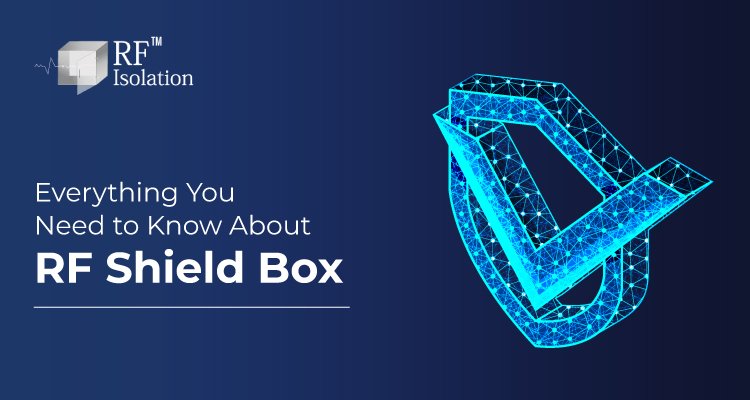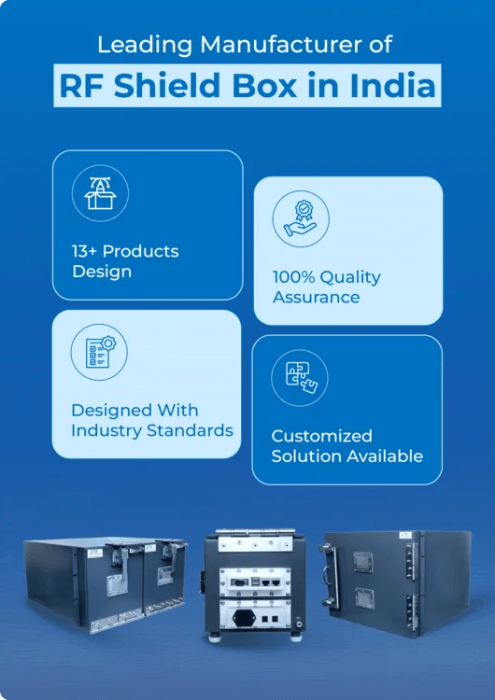
If you’re considering investing in an RF shield box, it is vital to know everything there is to know about it first.
For the uninitiated, RF is short for Radio Frequency Shield Box. It helps to block or restrict electromagnetic (EM) or radio frequency (RF) interference.
As you may already know, radio frequency has become omnipresent in this digital age. So it is critically important to protect computers and other types of electronic devices from radio frequency waves.
If you fail to restrict radio frequency interference, it can affect the performance as well as the functionality of electronic devices. And this is the part where RF shield boxes come into play.
Today, there are plenty of use cases for an RF shield box.
In this blog, we’ve explained which materials are used in RF shield boxes, their types, costs, and how to uplift their effectiveness, should you decide to buy one.
RF shield boxes can come in variety of forms, materials, and manufacturing methods. This is because RF shield boxes have a wide range of applications across various industries.
For starters, RF shield boxes can be used for many different purposes including automotive multimedia tests, wireless semiconductor tests, mobile telephone tests, WLAN/Bluetooth/WiMax tests, cellular network tests, and even base station transceiver tests.
RF shield boxes are generally manufactured using three different types of metals:
The aluminum material is typically used in the form of foil to prevent low-frequency radio field waves.
The steel-based material, on the other hand, is used for different processes including cold rolling, hot rolling, annealing of material, etc., which can have an incredible effect on shielding capabilities.
The copper-based RF shield boxes not only have high conductivity but also provide greater resistance to oxidation & corrosion.
So if you’re looking for an ideal RF shield box for outdoor environments, copper would be the right material choice.
However, knowing the materials used for RF shield box manufacturing is not enough to make the right decision. You also need to know about the different types of RF shield boxes available in the market.
Nowadays, RF shield boxes not only come in different materials but also in different shapes as well as sizes.
For example, you can buy an RF shield box in the form of regular metal boxes, metal films, and conductive foams. Depending on your requirements, you can choose the type of RF shield box that’s right for you.
To identify the right type, you must consider the above-mentioned factors along with the manufacturing company.
If you’re out shopping for an RF shield box, you should do proper research and gain complete knowledge to identify the right RF shield box. Furthermore, you can even consider investing in RF sensors in addition to an RF shield box for superior performance.
Cost is another essential factor every company takes into account when they’re planning to invest in an RF shield box. However, the performance of an RF shield box is equally important as the price and both must go hand in hand if you’re planning on buying one.
On the flip side, if you’re on a strict budget and cannot afford a premium RF shield box right now, you can consider buying a steel-based RF shield box. Compared to copper, steel shield boxes are 10% cheaper and have satisfactory performance for most purposes.
By far, you have learned about the use cases, types, materials, and cost of buying an RF shield box. All this information can be incredibly helpful in picking the right RF shield box for your needs.
But whatever material or type of RF shield box you invest in, you can always improve the effectiveness of your RF shield box.
While the best solution would be a sealed RF shield box without any openings whatsoever. But we all know that such kind of solution is neither logical nor practical since the electronic device placed inside the box will require inputs & outputs.
The ideal solution to increase the efficiency & effectiveness of your RF shield box is by using the test device in conjunction with various kinds of compression techniques such as grounding, filtering, and so on.
And there you have it! You have now learned all ins and outs of RF shield boxes. Hopefully, you can now use this information to identify the best RF shield box for your needs.
That said, it is important to choose the right manufacturer of RF shield boxes. That’s because RF shield box manufacturing requires specialized knowledge, expertise, and experience to build a long-lasting RF shielding box.
If you don’t know any reputable RF shield box manufacturer, RF Isolation can help.
We’re a global leader in manufacturing customizable RF-shielded boxes, chambers, test racks, and more. Feel free to contact us to build a customized RF shield box that fits your performance requirements!
Read More:

Please fill in your details to receive a call from our sales team about the right product for you.